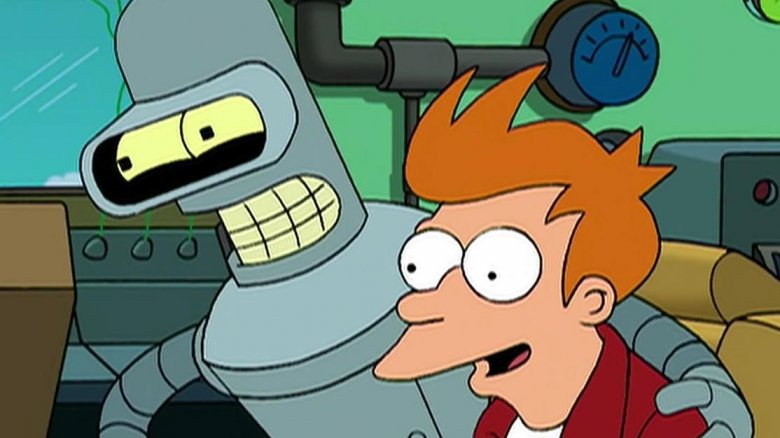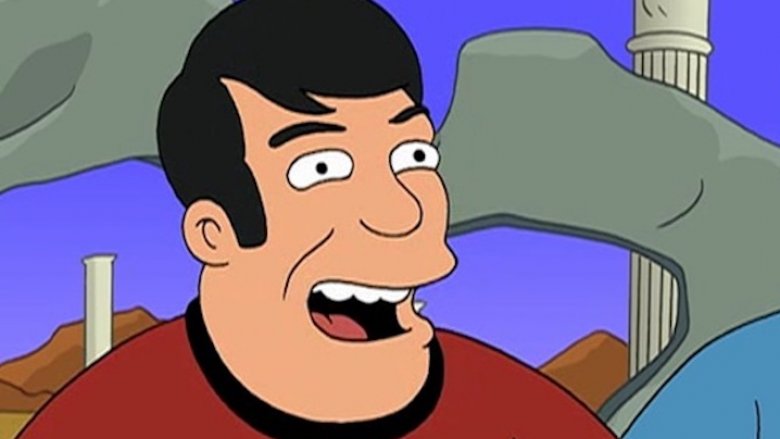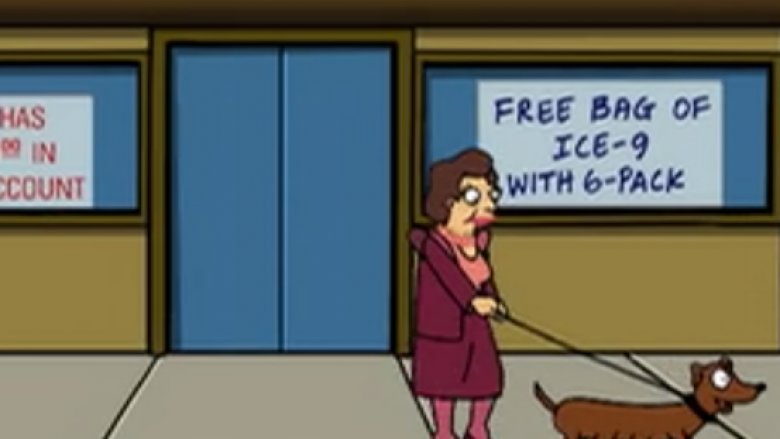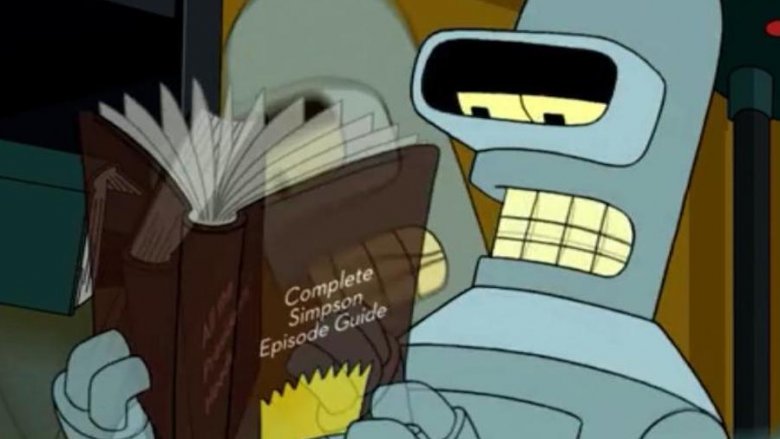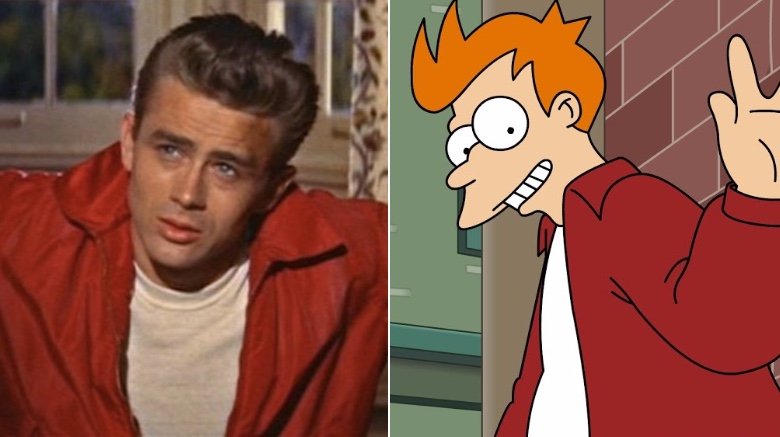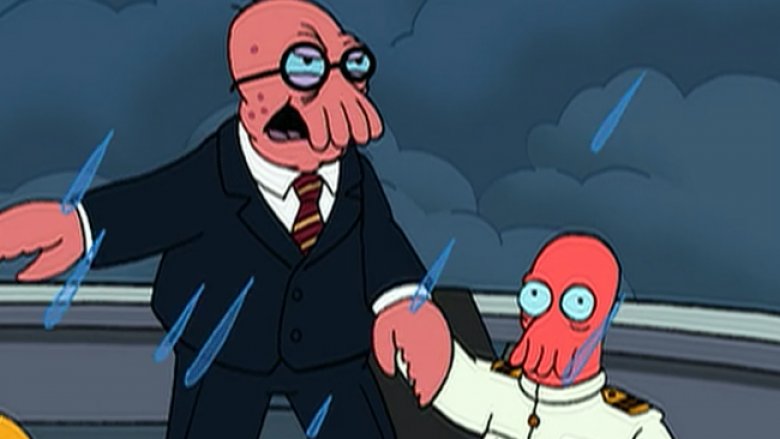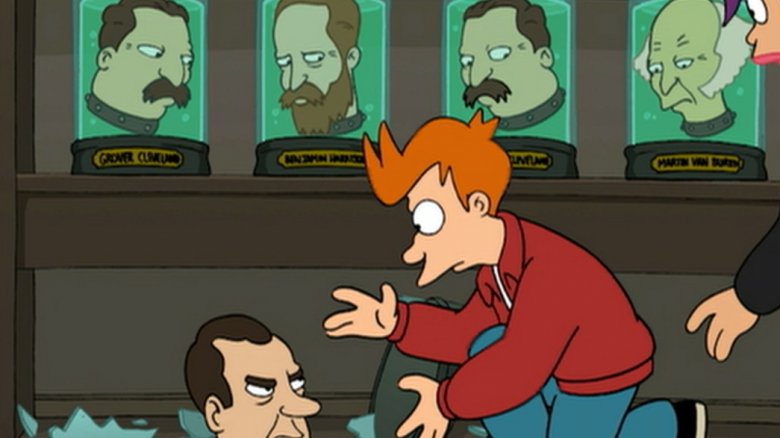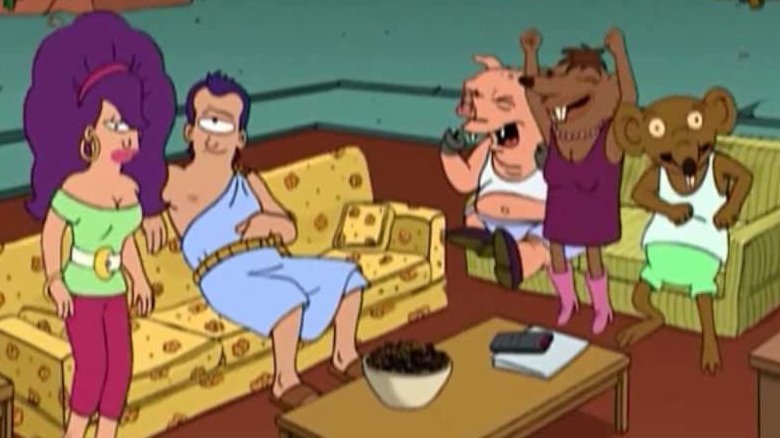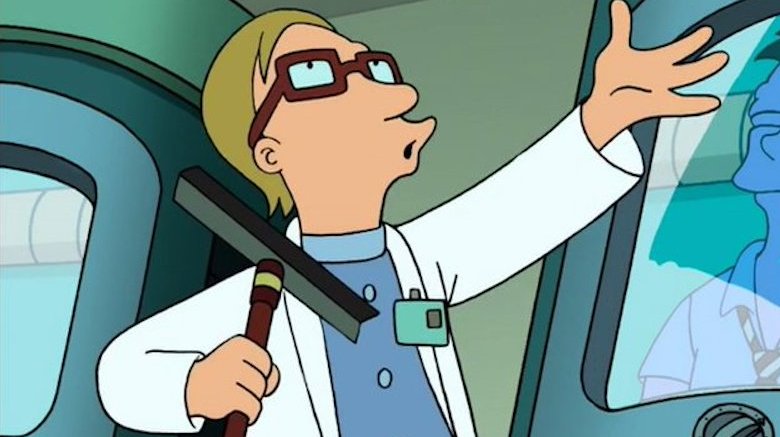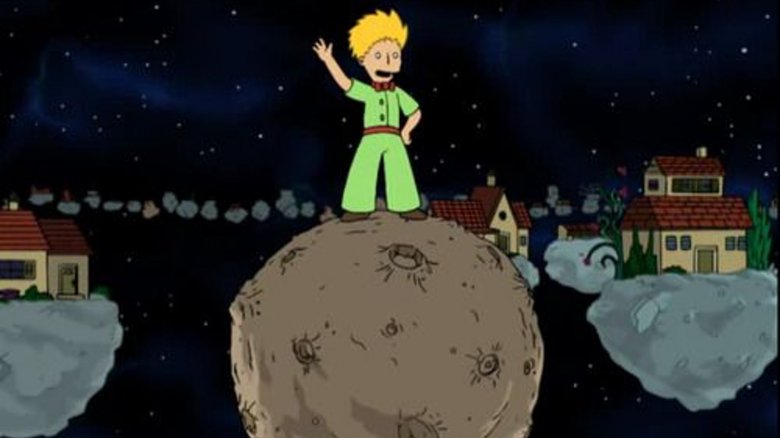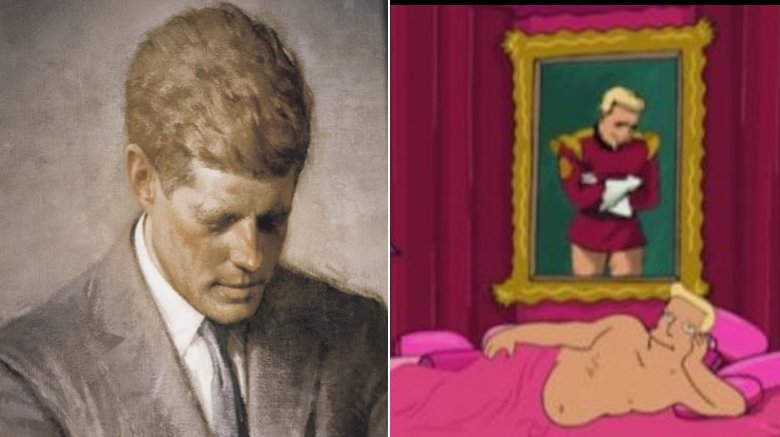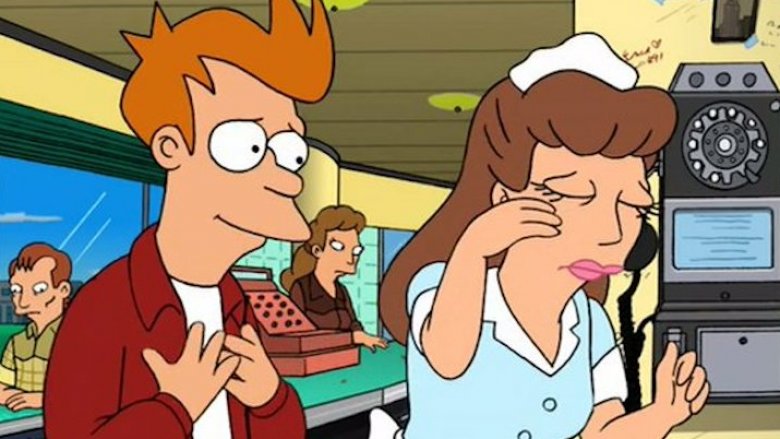Futurama References You Missed
We may receive a commission on purchases made from links.
Airing from 1999 to 2013, off and on across Fox and Comedy Central, Futurama took the animation and humor style of co-creator Matt Groening's previous show, The Simpsons, and sent it into the world of tomorrow. Set in the 30th century, the show follows the adventures of Philip J. Fry, a pizza delivery boy from 1999 who falls into a cryogenic freezing pod and wakes up in the vastly different New New York City of 1,000 years in the future. He soon finds work at Planet Express, an interplanetary delivery firm started by his distant nephew Professor Farnsworth. Fry also finds his tribe in Leela, a one-eyed pilot, and Bender, a sociopathic robot.
Not only does Futurama look like The Simpsons, but every scene is similarly dense with layers upon layers of jokes and references. Here are some of the most obscure — and easy to miss — moments from the hilarious sci-fi saga.
Good old Welshy
In the 2002 episode "Where No Fan Has Gone Before," Star Trek lover Fry is dismayed to learn that after the show's fandom became a religion, its fans all died in the Star Trek Wars, and the only copies of Trek episodes and movies were dumped on the planet Omega 3. Fry and company steal away Leonard Nimoy's head from the Head Museum and journey to that world to get the tapes. It is on this forbidden world where an energy cloud named Mellvar keeps the original Star Trek cast. He keeps them eternally young, but also forces them to do Star Trek things, like a never-ending convention and to act out his fan fiction.
In this Trek-reference-laden episode, veteran Trek actors Nimoy, William Shatner, Walter Koenig, George Takei, and Nichelle Nichols all voice their animated counterparts, with one glaring omission: James Doohan, who portrayed Enterprise chief engineer Montgomery Scott, a.k.a. Scotty. Instead of the Scottish guy, they've got a Welsh guy named... Welshy. He speaks only twice, uttering "Aye!" and "I am very drunk" in Welsh. It's explained that Welshy first appeared in some Star Trek "musical specials" because "the guy who played Scotty had trouble yodeling." This could also be a reference to The Brady Bunch Variety Hour, a series of '70s specials that reunited everyone from The Brady Bunch but replacing Eve Plumb (Jan) because she didn't want to sign a potentially restrictive long-term contract.
A black hole full of references
Viewers have come to expect an ever-changing sight gag in the opening credits of primetime animated series. The Simpsons has Bart writing something different on a blackboard each week, American Dad! shows alien Roger popping up in his various disguises, the business next door to the titular restaurant on Bob's Burgers is forever different, and Futurama offers a one-liner at the bottom of its title screen.
Some past examples include: "As seen on TV," "For external use only," and, on the 2010 episode "The Prisoner of Benda," "What happens in Cygnus X-1 stays in Cygnus X-1." That's a two-fer of a reference. First, it plays off of the long-used, universally known Las Vegas tourism slogan "What happens in Vegas, stays in Vegas," but substituting in the name of what sounds like a made-up alien planet from Futurama. Cygnus X-1 is a real thing, however. It's a stellar-mass black hole, a 700 light years-wide cosmic entity said to have formed from the collapse of a star. As black holes have tremendous gravitational pull and suck in anything that dares come near, well, what happens in Cygnus X-1 definitely stays in Cygnus X-1.
The cat's in the cradle
Like its Matt Groening-created predecessor The Simpsons, Futurama features numerous lightning-quick visual gags in the form of funny signs, ads, billboards, reader boards, and the like. But because it's a science-fiction show, Futurama writers and animated have a much bigger toolbox to work with, and pepper the background of episodes with barely visible signs that reference other works of genre fiction or some aspect of its futuristic setting.
The 2000 episode "War is the H-Word," in which Fry and Bender join the Earth Army and go off to fight an alien race of spheres, is a full-length riff on the Robert Heinlein book and 1997 movie Starship Troopers, with its events set in motion by a visit to a convenience store. In an establishing shot of 7-11, there's a sign in the window that offers even more numbers: "Free bag of Ice-9 with six-pack." On the surface, that's a funny number/wordplay joke. On a deeper level, it's a reference to Kurt Vonnegut's seminal 1963 novel Cat's Cradle, in which a well-meaning scientist develops ice-nine to be used to quickly solidify liquid or murky terrain to make life easier for marching soldiers, only for it to infect the ocean and likely turn all water on earth to ice, killing all life. A natural promotion, in other words, for people buying beer at 7-11.
It doesn't take much to read into this one
In the 2011 Futurama episode "Overclockwise," young clone Cubert Farnsworth gives Bender the robot a powerful upgrade to his operating system, "overclocking" him to the point where he gains superpowers. Speed-reading is among his new abilities, and he devours every book on the big shelf in the Planet Express conference room in a matter of seconds. Among the titles he instantly devours: Calculus, Advanced Calculus, the NNYC Phone Book, The Basketball Diaries, The Oxford English Dictionary, and Decline and Fall of the Romulon Empire, a book that's apparently about an alien race from Star Trek.
He also puts away Wuthering Gattaca, evidently a combination of Emily Brontë's Wuthering Heights and the 1997 Ethan Hawke sci-fi movie Gattaca. Then, for just a fraction of a second, a book called How I Conquered Your Planet appears in Bender's hands — a title the guy who says "kill all humans" all the time would certainly enjoy. That's actually a real book, although an obscure, self-published one. It's a 2006 comic/sci-fi/detective novel by John Swartzwelder, a veteran staff writer for The Simpsons.
Just a couple of Rebels
Like most every character on a continuing cartoon series, Philip J. Fry wears the exact same clothes (not counting the occasional protective space suit) in almost every episode of Futurama. That ensemble was what he was wearing when he arrived in the year 3000, having fallen into a cryogenic freezing chamber in 1999 — blue jeans, a white T-shirt, and a red windbreaker. He doesn't much care that his old-fashioned clothes make him stick out in New New York, but then his outfit was also a bit outdated for 1999. All things considered, it probably doesn't bother Fry, because his sartorial choices make him resemble one of the coolest dudes who ever lived. His clothes match exactly the ones worn by bad boy actor James Dean in the 1955 classic of juvenile delinquent cinema, Rebel Without a Cause.
An act of shellfishness
Never before has there been a character quite like Dr. John Zoidberg. A humanoid crustacean from the planet Decapod 10, he's the desperately lonely but personally off-putting Planet Express staff doctor who knows next to nothing about human anatomy and lives in the dumpster behind his place of business. He also speaks with a distinctive accent that voice actor Billy West told Comedy Central he settled on by combining impressions of two different entertainers, both of whom are almost completely forgotten to modern audiences. One of them is "marble-mouth George Jessel," a vaudeville comedian and early film star who had his own radio show in the early '50s. The other major Zoidberg component: Canadian character actor Lou Jacobi, who West says "had this almost rabbinical" quality to his voice.
When the series introduced Zoidberg's uncle in the 2001 episode "That's Lobstertainment!" writers went back to the old Hollywood well. Harold Zoid, a star from the "silent hologram era," has a name and character which riff on silent film comedian Harold Lloyd.
The Cleveland show
There are a handful of "fun facts" about the American presidents that virtually everybody seems to know. For example, most people know that future Futurama Earth President Richard Nixon was the only American president to resign, and that Grover Cleveland is the only president to ever serve two non-consecutive terms in office (1885–1889, and 1893–1897). Futurama writers buried a clever, jokey reference to this bit of historical knowledge, and one that violates all laws of reality to boot.
In the 1999 pilot episode of Futurama, Fry has to take in a lot about life in the year 3000, and all at once. That includes the discovery that scientists have learned to keep human heads living in jars indefinitely, and that the noggins of many individuals take residence in New New York's Head Museum. Like many museums (or Walt Disney World), the Head Museum features a Hall of Presidents — home to the actual, living, suspended-in-solution heads of past Commanders-in-Chief, including Jimmy Carter, Bill Clinton, Andrew Jackson, and Grover Cleveland. Actually, because he was president on two separate occasions, the Head Museum holds two Grover Cleveland heads.
Married... with cyclops
In the early seasons of Futurama, Leela feels alone in the universe. Not only is she unhappily single, but she believes she's an orphan and possibly the last living Cyclops. In the 2000 episode "A Bicyclops Built for Two," all her dreams look to come true when she falls in love with a man named Alcazar, who purports to be the last male Cyclops. She travels with him to their supposedly empty home planet of Cyclopia, where he lives in a castle.
He's a lovely guy... until the morning after they sleep together. Suddenly, Alcazar — or Al, as he prefers to be called — is a selfish chauvinist pig. He demands she make him breakfast, then insults her cooking, and before long he's sitting glumly on an old couch watching TV, trading crude sex jokes and insults with a dissatisfied Leela, who has done her hair the way Al likes it — up and huge. This end result closely mirrors the premise and action of Married... with Children, the early Fox hit on which Katey Sagal (who voices Leela) starred as big-haired Peggy Bundy opposite Ed O'Neill as rude, crude Al Bundy.
Welcome to the world of the past
The carnivalesque word "Futurama" is a pretty good title for the show that would become Futurama. After all, it's set in the future, and follows a man from the 20th century who's constantly astounded (or nearly killed) by all that the far-off 31st century has to offer in the way of space travel, robots, and amazing inventions. But Futurama co-creators Matt Groening and David X. Cohen didn't just make up that word. According to a first season DVD commentary, it won out over some other, invented ideas, including Doomsville and Aloha, Mars. "Futurama" implies optimistic, future-forward thinking, and it happened to be the name of an attraction in the General Motors pavilion at the 1939 New York World's Fair.
The ride took visitors through a miniature landscape of an America 20 years hence, which included such novel concepts as widespread ownership of cars that used radio signals to keep their distance from each other, which they'd drive on an intricate, countrywide highway system. With the New York World's Fair in 1964 came Futurama II, which included such Futurama-worthy predictions as underwater hotels and moon tourism. A slogan of the 1939 iteration promised a look into "the world of tomorrow," and when Applied Cryogenics tech Terry greets Fry after he wakes up in the future, he cries out, "Welcome to the world of tomorrow!"
A little Little Prince joke
"The Route of All Evil" from 2002 is the rare Futurama episode that focuses on the kids — the tween-age offspring of Professor Farnsworth and Planet Express accountant Hermes Conrad. In this installment, Cubert Farnsworth (the Professor's know-it-all-clone) and Dwight Conrad (Hermes' laid-back son) go into business and direct competition with their dads, creating Awesome Express and scoring a lucrative contract to deliver the Daily Supernova newspaper to strange and distant points in outer space, primarily suburban-style homes perched on asteroids.
At one point in the episode, Cubert and Dwight's dads zoom past an asteroid occupied by only an innocent-looking blond boy in a pale green outfit. The rolled-up paper strikes him right in the eye... and sends him off his home rock and spinning into the oblivion of space. "Au revoir!" he screams as he disappears. This space boy is rendered in a subtle, classical artistic way, as opposed to Futurama's usual modern, eye-popping look. That's because he's taken straight out of a 1943 children's book. That boy is the title character from The Little Prince, or Le Petit Prince, the tale by Antoine de Saint-Exupéry about a lonely little boy who lives on a tiny asteroid.
A true work of art
Captain Zapp Brannigan is as odious as they come, a staggeringly mediocre man who somehow becomes a 25-star general in the Democratic Order of Planets with command of its most important space vessel, the Nimbus. He is utterly incompetent and is constantly saved from complete ruin by his number two, Kif, but Zappa's too arrogant and entitled to notice or care that his accomplishments are not his own. He sails through life with this unearned confidence, enacting reckless military strategies and thinking he can seduce any woman he pleases, and that woman is usually Turanga Leela.
In the 1999 episode "Love's Labour's Lost in Space," he thinks he's going to get her to join him in bed by laying upon it with his paunch sticking out over the covers. Behind him on the wall hangs what appears to be his official captain's portrait, which depicts him regally and reverentially, his arms crossed and his head bowed as if deep in thought, as it to suggest a soulful, thoughtful leader of men. He's none of those things, of course, which is why it's hilarious. It's also an exact re-creation of a famous painting: Aaron Shikler's official presidential portrait of John F. Kennedy. Zapp would compare himself to a revered politician, wouldn't he?
The best incest jest
In the 2001 episode "Roswell That Ends Well," Fry microwaves a metal popcorn container on the Planet Express ship, upsetting the balance of radiation and sending the ship back in time and space, crash-landing in Roswell, New Mexico, in 1947. To return to the future, Professor Farnsworth needs microwave technology of some kind, and the microwave antenna at the local military base would work. He warns Fry that acquiring it could be tricky, as Fry's grandfather Enos works at that base, and if he killed him he'd erase his existence. Fry tries to protect his grandfather as best he can, and to prevent harm, he locks him in a house... which he doesn't realize is located on a nuclear weapon testing range.
Such a test kills Enos almost immediately, and Fry tries to comfort Enos' fiancée, a diner waitress named Mildred... but they wind up sleeping together. Fry figures that since he didn't blink out of existence when Enos died, then Enos must not have been his grandfather. It tracks, however, that Mildred is still his grandmother, and became pregnant by a different guy, and that man was Fry. Professor Farnsworth later derisively refers to Fry as "Mr. I'm-My-Own-Grandpa," an explicit reference to "I'm My Own Grandpa," a hit novelty song by the duo Lonzo and Oscar. It's a strange tune that details the odd circumstances by which a man becomes his stepmother's stepfather, and thus, by default, his own grandpa. Oddly enough, the song was released in 1947.
